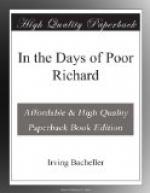“Now that we are on neutral ground, I want to say that you Americans are a stiff-necked lot of people. You are not like any other breed of men. I am done with you. My way can not be yours. Let us part as friends and gentlemen ought to part. I say good-by with a sense of regret. I shall never forget your service to my wife and daughter.”
“Think not of that,” said the young man. “What I did for them I would do for any one who needed my help.”
“I have to ask you to give up all hope of marrying my daughter.”
“That I can not do,” said Jack. “Over that hope I have no control. I might as well promise not to breathe.”
“But I must ask you to give me your word as a gentleman that you will hold no further communication with her.”
“Sir Benjamin, I shall be frank with you. It is an unfair request. I can not agree to it.”
“What do you say?” the Englishman asked in a tone of astonishment, and his query was emphasized with a firm tap of his cane on the pavement.
“I hate to displease you, sir, but if I made such a promise, I would be sure to break it.”
“Then, sir, I shall see to it that you have no opportunity to oppose my will.”
In spite of his fine restraint, the eyes of the Baronet glowed with anger, as he quickly turned from the young man and hurried away.
“Here is more tyranny,” the American thought as he went in the opposite direction. “But I do not believe he can keep us apart.”
“I walked on and on,” he wrote to a friend. “Never had I felt such a sense of loss and loneliness and dejection. I almost resented the inflexible tyranny of my own spirit which had turned him against me. I accused myself of a kind of selfishness in the matter. Had it been right in me to take a course which endangered the happiness of another, to say nothing of my own? But I couldn’t have done otherwise, not if I had known that a mountain were to fall upon me. I am like all of those who follow the star in the west. We do as we must. I had not seen Franklin since my duel, and largely because I had been ashamed to face him. Now I felt the need of his wisdom and so I turned my steps toward his door.”
3
“I am like the land of Goshen amid the plagues of Egypt,” said Franklin, when the young man was admitted to his office. “My gout is gone and I am in good spirits in spite of your adventure.”
“And I suppose you will scold me for the adventure.”
“You will scold yourself when the consequences have arrived. They will be sure to give you a spanking. The deed is done, and well done. On the whole I think it has been good for the cause, but bad for you.”
“Why?”
“You may have to run out of England to save your neck and the face of the King. He was there, I believe?”
“Yes, sir.”
“The injured lad is in a bad way. The wound caught an infection. Intense fever and swelling have set in. I helped Sir John Pringle to amputate the arm this afternoon, but even that may not save the patient. Here is a storm to warn the wandering linnet to his shade. A ship goes to-morrow evening. Get ready to take it. In that case your marriage will have to be delayed. Rash men are often compelled to live on hope and die fasting.”




